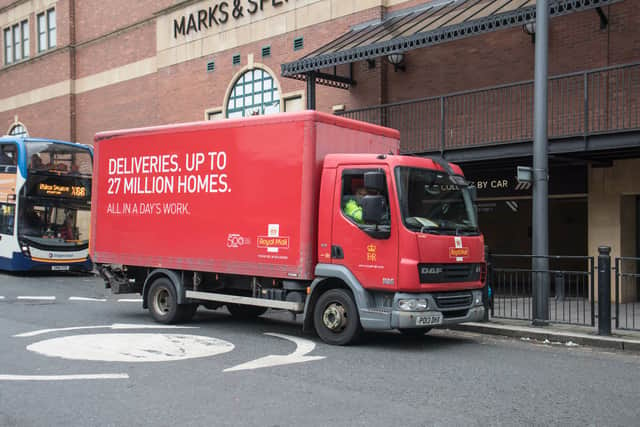Driving licence change could let motorists drive lorries without formal test to ease HGV shortage
and live on Freeview channel 276
Motorists who hold a regular car licence could be given permission to drive large goods vehicles without any additional testing under plans being explored by the Government.
The Department for Transport has launched a “call for evidence” on a number of proposals intended to address the ongoing shortage of HGV drivers.
Advertisement
Hide AdAdvertisement
Hide AdAmong these are removing previous restrictions imposed by the EU on the maximum mass of vehicle a motorist could drive on a standard B1 class licence.
The Government says that by restoring so-called “grandfather rights” it could help encourage more people to consider a career in the haulage industry.


Before 1997, anyone with a car licence (category B) also got automatic category C1 entitlement, which allowed them to drive vehicles between 3.5 and 7.5 tonnes in combination with a trailer of up to 750kg. However, under EU directives, anyone who passed their car test from 1 January 1997 is limited to vehicle and trailer weight of no more than 3.5 tonnes and a separate test is required for a C1 licence.
Since the EU rules no longer apply, the Government is exploring whether to grant C1 eligibility to all category B licence holders who passed their test from 1 January 1997. This would allow anyone with a regular car licence to drive large vans and small lorries up to 7.5 tonnes without any further driving tests.
Advertisement
Hide AdAdvertisement
Hide AdCurrently, drivers trying to obtain a C1 licence need to sit additional practical and theory tests, undergo a medical check and undertake 35 hours of training every five years.
Transport Minister Karl McCartney said: “Our country has a robust supply chain and our ongoing and unprecedented support for the haulage sector means that the number of HGV drivers is stabilising.
“We continue looking for ways to make it easier and quicker to kickstart a rewarding career in logistics. That’s why we’re asking people for their views on how we could streamline the licensing process and remove any potential barriers – making the most of our post-Brexit freedoms.”
Other options being considered under the call for evidence include publishing pass rates for instructors as part of a formal register, in an effort to raise training standards, and permitting mechanics who already have a HGV licence to drive vehicles such as buses and coaches for repair purposes.
Advertisement
Hide AdAdvertisement
Hide AdThe UK has faced a shortage of HGV drivers since the Covid pandemic due to a combination of factors including cancelled tests, post-Brexit bureaucracy and complaints over working conditions, which have seen the number of drivers drop dramatically.
The shortage has caused supply issues for supermarkets and other retailers and led to fuel shortages last summer as suppliers struggled to reach filling stations.
Mr McCartney said that any changes being considered “would need to ensure continued safe use of our roads and be economically proportionate”, adding: “Government does not have all the answers and, to be very clear, we have not made up our minds to do any of this.”
Comment Guidelines
National World encourages reader discussion on our stories. User feedback, insights and back-and-forth exchanges add a rich layer of context to reporting. Please review our Community Guidelines before commenting.
